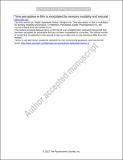Time perception in film is modulated by sensory modality and arousal
Author(s)
Appelqvist-Dalton, Mattis; Wilmott, James P.; He, Mingjian; Simmons, Andrea M.
Download13414_2022_2464_ReferencePDF.pdf (1.428Mb)
Publisher Policy
Publisher Policy
Article is made available in accordance with the publisher's policy and may be subject to US copyright law. Please refer to the publisher's site for terms of use.
Terms of use
Metadata
Show full item recordAbstract
Abstract
Considerable research has shown that the perception of time can be distorted subjectively, but little empirical work has examined what factors affect time perception in film, a naturalistic multimodal stimulus. Here, we explore the effect of sensory modality, arousal, and valence on how participants estimate durations in film. Using behavioral ratings combined with pupillometry in a within-participants design, we analyzed responses to and duration estimates of film clips in three experimental conditions: audiovisual (containing music and sound effects), visual (without music and sound effects), and auditory (music and sound effects without a visual scene). Participants viewed clips from little-known nature documentaries, fiction, animation, and experimental films. They were asked to judge clip duration and to report subjective arousal and valence, as their pupil sizes were recorded. Data were analyzed using linear mixed-effects models. Results reveal duration estimates varied between experimental conditions. Clip durations were judged to be shorter than actual durations in all three conditions, with visual-only clips perceived as longer (i.e., less distorted in time) than auditory-only and audiovisual clips. High levels of Composite Arousal (an average of self-reported arousal and pupil size changes) were correlated with longer (more accurate) estimates of duration, particularly in the audiovisual modality. This effect may reflect stimulus complexity or greater cognitive engagement. Increased ratings of valence were correlated with longer estimates of duration. The use of naturalistic, complex stimuli such as film can enhance our understanding of the psychology of time perception.
Date issued
2022-03-18Department
Harvard University--MIT Division of Health Sciences and TechnologyPublisher
Springer US
Citation
Appelqvist-Dalton, Mattis, Wilmott, James P., He, Mingjian and Simmons, Andrea M. 2022. "Time perception in film is modulated by sensory modality and arousal."
Version: Author's final manuscript